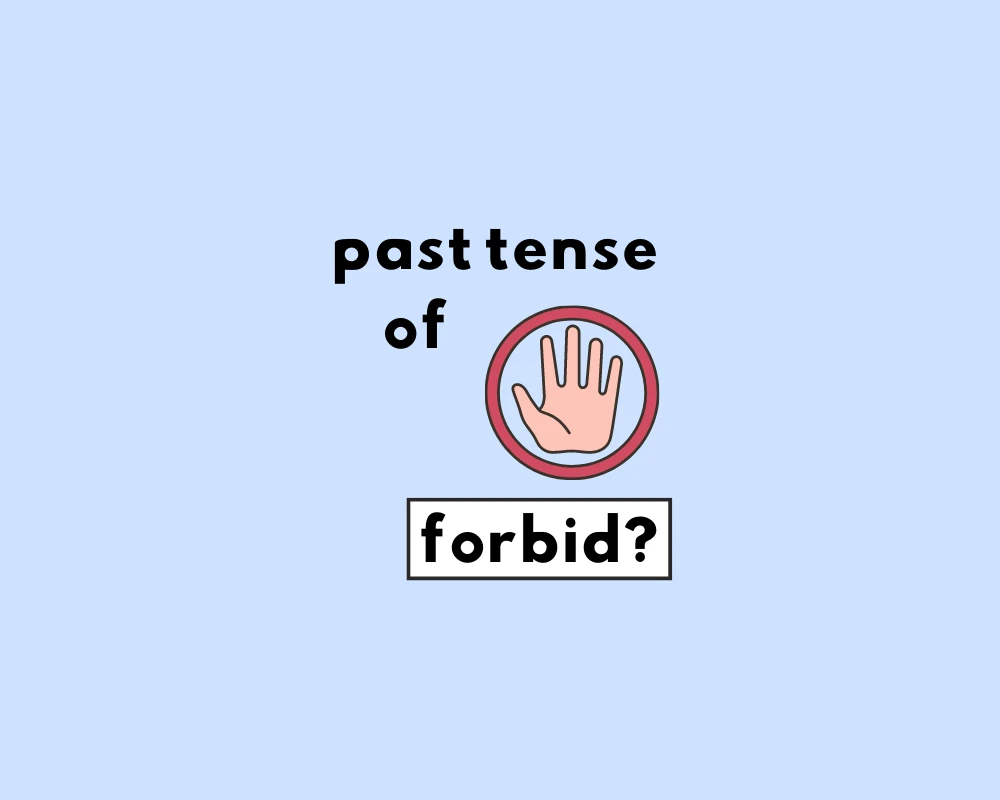Contents
Toggle
What does the word ‘forbid’ mean?
To forbid describes the action of when we, “command (a person) not to do something, have something, etc., or not to enter some place: She forbade him entry to the house.” Forbid is an irregular verb, since neither of its past forms end in –ed. See how forbid conjugates to its other verb forms, in the sections below.
What are the tenses of forbid?
| present | past | future | |
| simple | I forbid | I forbade | I will forbid |
| continuous | I am forbidding | I was forbidding | I will be forbidding |
| perfect | I have forbidden | I had forbidden | I will have forbidden |
| perfect continuous | I have been forbidding | I had been forbidding | I will have been forbidding |
Forbid is the present tense: I forbid you from entering the restricted area.
Forbid/forbade is the simple past: The company forbade smoking in the office premises.
Forbidding is the present participle: The teacher, forbidding any distractions, asked the students to put away their cell phones during class.
Forbids is third-person present singular: He forbids his children from watching television on weekdays.
Forbidden is also the past participle: The forbidden fruit tempted Adam and Eve in the Garden of Eden.
What’s the past tense vs. past participle form of forbid?
The simple past tense (forbid/forbade) is used to refer to an event or action that took place and was completed entirely in the past. We would use the participle form of the verb (forbidden) to create other aspects of tense, known as the perfect aspect or tenses in grammar.
To form the perfect aspect in grammar, we pair the past participle form of the verb with an auxiliary verb, like was or had. This is shown in the second sentence since it uses the auxiliary ‘was‘, whereas in the simple past tense there is no auxiliary verb present to supplement the participle.
Past tense: My parents forbade me from attending the late-night party.
Past participle: The sign indicated that photography was strictly forbidden in the museum.
Sentences with forbid in the simple present tense:
I forbid you from using my computer without permission.
She forbids her children from eating junk food.
The school forbids students from wearing hats indoors.
They forbid smoking in all public areas.
The sign clearly forbids parking in this area.
Sentences with forbade in the simple past tense:
My parents forbade me from going to the party last night.
The law forbade smoking in restaurants until recently.
The school administration forbade students from using cell phones in the classroom.
The company forbade employees from discussing their salaries.
The regulations forbade the use of fireworks in the park.
Sentences that use the past participle, forbidden:
The forbidden fruit symbolizes temptation in many religious texts.
The sign indicated that photography was strictly forbidden in the museum.
The committee has declared certain substances to be forbidden in athletic competitions.
The forbidden knowledge was hidden away in a secret library.
The document contained a list of forbidden items that were not allowed on the airplane.
What are words similar to forbid?
- prohibit
- ban
- bar
- restrict
- disallow
- outlaw
- veto
- prevent
- deny
- hinder
Origin of the verb forbid
From etymology online on forbid (v.):
Old English forbeodan “forbid, prohibit” from for- “against” + beodan “to command”.
Sources
1. Harper, Douglas. “Etymology of forbid.” Online Etymology Dictionary, https://www.etymonline.com/word/forbid. Accessed 30 May, 2023.










